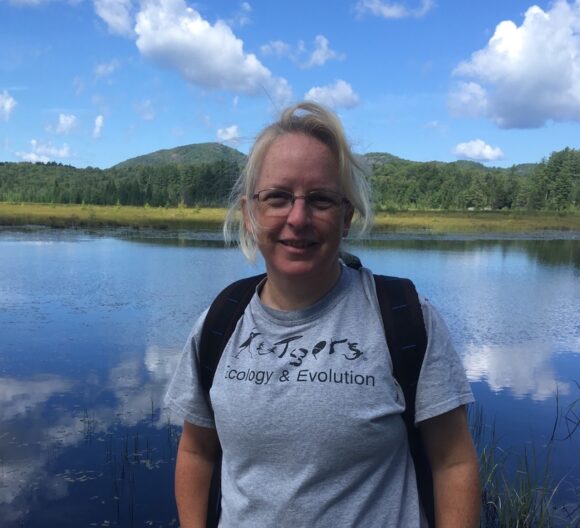Julie Lockwood, chair and professor in the Department of Ecology, Evolution, and Natural Resources, was honored with the School of Graduate Studies Dean’s Advisory Council Award for the Mentoring of Graduate Students in the Biological, Biomedical and Health Sciences category. The Excellence in Teaching and Mentoring Award recognizes graduate faculty who have made significant contributions to graduate education at Rutgers University.
Lockwood, who joined the Rutgers faculty in 2003, studies biological invasions by non-native species and coastal ecosystems. She has served as primary advisor for 19 students, all of whom have moved on to faculty, research or postdoctoral positions. Lockwood is sought after for membership on scientific panels, journal editorships and keynote lectures, maintaining a daunting level of activity and service in the university and in the profession.
Lockwood’s current and former students, who jointly submitted the nomination for this award, summarized her approach to mentorship in this way:
“Julie goes out of her way to ensure students succeed in the dynamic and challenging environment of graduate school. Despite her busy schedule, she ensures all students have the ability to meet one-on-one every week… Julie understands that there is more to graduate school than research and teaching. For many students, graduate school can be a challenging process which involves relocating to a new area, balancing personal/family life and work, as well as variable and sometimes extensive work hours… By ensuring her students thrive outside of the lab and the classroom, Julie establishes a lab culture in which students can endure the challenges of graduate school without sacrificing their physical and mental health… Julie works closely with each student to develop long term career and research goals. This individual-focused approach to mentoring starts the first day students begin to work with her. While plans may change over time, Julie works with her students to forecast career goals and then helps students build skills to achieve these goals.”
“While she is involved in high impact research, she does not require her students to work on the same topics that she does. She simply asks that her students ‘bring her along’ on their research journeys. It is through ‘bringing her along’ that I learned the most about being a scientist and mentor. Of course, she did not need me to bring her along in my research, but rather I needed to have somewhere to openly discuss my ideas, what was working, what was not, etc., and I needed to be gently steered in the right direction. I realize now that the best ideas I had as a graduate student (which were probably not entirely my ideas at all) came as the result of these meetings.”
“What I learned from Julie equipped me to be an ecologist in search of new ground to cover, but it also helped make me a more whole person and appreciate the motivations for my work.”
Lockwood is the co-author of two books, Invasion Ecology and Avian Invasions: The Ecology and Evolution of Exotic Birds. She has edited two other books and has two more in preparation. She has published more than 100 peer reviewed papers, numerous book chapters and reports. Her work has been supported by grants from NSF, USDA and many other government organizations and foundations.


